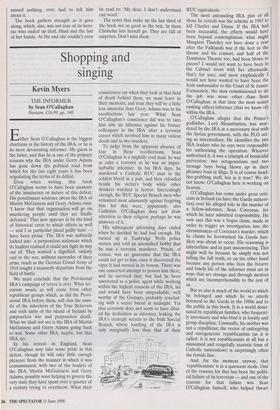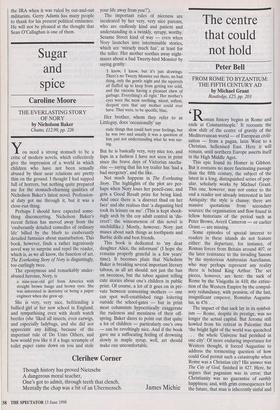Shopping and singing
Kevin Myers
THE INFORMER by Sean O'Callaghan Bantam, £16.99, pp. 340 Either Sean O'Callaghan is the biggest charlatan in the history of the IRA, or he is its most devastating informer. My guess is the latter, and that he is one of the primary reasons why the IRA under Gerry Adams has gone down the political road from which for the last eight years it has been negotiating the terms of its defeat. Even when writing this book O'Callaghan seems to have been unaware of the imminence or nature of this defeat. His penultimate sentence about the IRA of Martin McGuiness and Gerry Adams runs: `I know that that organisation will go on murdering people until they are finally defeated.' That now appears to be the kind of historical error to which others as well — and I in particular plead guilty here have been prone. The IRA was militarily locked into a purposeless stalemate which its leaders realised it could not fight its way out of. They wanted a dignified, orderly end to the war, without surrender of their arms, much as the German Grand Army of 1918 sought a mannerly departure from the field of battle.
We must conclude that the Provisional IRA's campaign of terror is over. What ter- rorism awaits us will come from other republican groups which, as did the Provi- sional IRA before them, will don the man- tle of the inheritors of the True Believers and seek unity of the island of Ireland by purposeless war and purposeless death. What we shall not see is the IRA of Martin McGuiness and Gerry Adams going back to war. Some other IRA, maybe; but that IRA, no.
In his retreat in England, Sean O'Callaghan may take some pride in this defeat, though he will take little enough pleasure from the manner in which it was consummated, with two of the leaders of the IRA, Martin McGuinness and Gerry Adams, possibly soon helping to govern the very state they have spent over a quarter of a century trying to overthrow. What their consciences say when they look at that field of death behind them, we must leave to their memoirs, and trust they will be a little less amnesiac than Gerry Adams was in his recollections last year. What Sean O'Callaghan's conscience did was to turn him into an informer against his former colleagues in the IRA after a terrorist career which involved him in many violent deeds and in two murders.
To judge from the apparent absence of fear in these recollections, Sean O'Callaghan is a mightily cool man: he was as calm a terrorist as he was an imper- turbable informer. In his IRA days, he murdered a Catholic RUC man in the coldest blood in a pub, and then reloaded beside his victim's body while other drinkers watched in horror. Interestingly enough, the RUC Special Branch men who remained most adamantly against forgiving him for this were, apparently, also Catholics. O'Callaghan does not draw attention to their religion: perhaps he was unaware of it.
His subsequent informing days ended when he decided he had had enough. He turned up at Tunbridge Wells police station and told an astonished bobby that he was a terrorist murderer. Prison, of course, was no guarantee that the IRA could not get to him, once it discovered the viper it had nursed in its bosom. There was one concerted attempt to poison him there, and he survived that; but had he been uncovered as a police agent while working within the highest councils of the IRA, his end would have been unspeakable, well worthy of the Gestapo, probably conclud- ing with a secret burial at midnight. Yet that certainty does not seem to have dilut- ed his dedication as informer, leaking the IRA's strategic secrets to the Irish Special Branch, whose loathing of the IRA is only marginally less than that of their RUC equivalents. The most astounding IRA plot of all those he reveals was the scheme in 1983 to kill Charles and Diana. If the IRA had been successful, the effects would have been beyond contemplation: what might Margaret Thatcher not have done a year after the Falklands war if the heir to the throne and his consort, and half of the Dominion Theatre too, had been blown to pieces? I would not want to have been in the Cabinet room with her afterwards, that's for sure; and most emphatically I would not have wanted to have been the Irish ambassador to the Court of St James. Fortunately, the man commissioned to do the job was none other than Sean O'Callaghan, at that time the most senior ranking officer/informer (that we know of) within the IRA.
O'Callaghan alleges that the Prince's godfather, Lord Mountbatten, was mur- dered by the IRA in a mercenary deal with the Syrian government, with the PLO act- ing as intermediary. He identifies the two IRA leaders who he says were responsible for authorising the operation. Whoever authorised it, it was a triumph of homicidal perversion: two octogenarians and two teenage boys being blown up in their pleasure boat in Sligo. It is of course head- line-grabbing stuff, but is it true? We do not know: O'Callaghan here is working on hearsay.
O'Callaghan has come under great criti- cism in Ireland (as have the Garda authori- ties) over his alleged role in the murder of a fellow-informer, Sean Corcoran, for which he later admitted responsibility. He now says this was a bogus claim, made in order to trigger an investigation into the circumstances of Corcoran's murder, which he claims he forewarned his Garda han- dlers was about to occur. His reasoning is labyrinthine and in part unconvincing. This might well be because he simply was not telling the full truth, or on the other hand because any person who lives the bizarre and lonely life of the informer must act in ways that are strange and through motives which are incomprehensible to the rest of us.
But so also is much of the world to which he belonged and which he so utterly betrayed to the Garda in the 1980s and to the public in this book. It is a world domi- nated by republican families, who frequent- ly intermarry and who bind it in loyalty and group discipline. Unusually, his mother was not a republican; the vector of unforgiving and unregenerate republicanism (as it is called: it is not republicanism at all but a misnamed and vengefully atavistic form of Catholic nationalism) is surprisingly often the female line.
And, for the moment anyway, that `republicanism' is in a quiescent mode. One of the reasons for that has been the politi- cal failure of its terrorism — and one of the reasons for that failure was Sean O'Callaghan himself, who helped thwart the IRA when it was ruled by out-and-out militarists. Gerry Adams has many people to thank for his present political eminence. He will not be pleased at the thought that Sean O'Callaghan is one of them.



































































 Previous page
Previous page